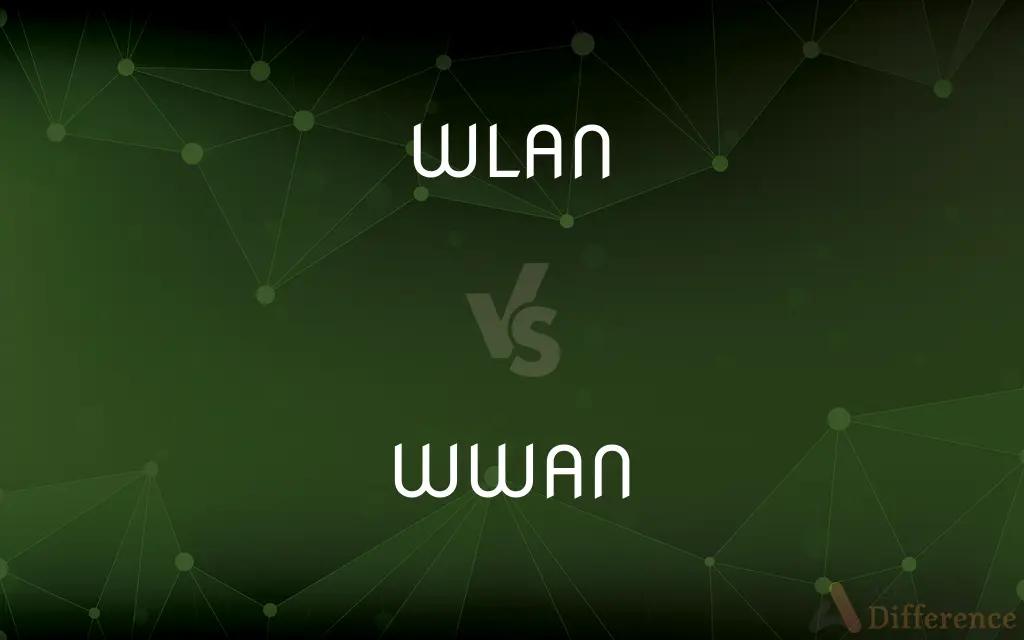WLAN vs. WWAN — What's the Difference?
Edited by Tayyaba Rehman — By Fiza Rafique — Published on December 14, 2023
WLAN is a local area wireless network, while WWAN is a wide area wireless network. WLAN and WWAN offer unique advantages: WLAN for fast, short-range connectivity, and WWAN for broader, albeit potentially slower, coverage.

Difference Between WLAN and WWAN
Table of Contents
ADVERTISEMENT
Key Differences
WLAN, standing for Wireless Local Area Network, provides wireless network communication over short distances, typically within a building or a home. WWAN, on the other hand, stands for Wireless Wide Area Network and is designed to cover larger areas, such as cities or countries.
WLAN typically relies on technologies like Wi-Fi, where access points are connected to the network and provide wireless coverage in their immediate vicinity. WWAN makes use of cellular technology, leveraging cell towers to transmit data across vast distances.
Both WLAN and WWAN offer unique advantages: WLAN for fast, short-range connectivity, and WWAN for broader, albeit potentially slower, coverage.
Comparison Chart
Coverage
Local (e.g., home, office)
Wide (e.g., city, country)
Primary Technologies
Wi-Fi
Cellular (e.g., 4G, 5G)
ADVERTISEMENT
Dependency
Requires access points
Uses cellular towers
Typical Speed
Faster (depending on connection)
Varies, often slower than WLAN
Application
Local connectivity within a confined space
Broad connectivity, mobile & remote locations
Compare with Definitions
WLAN
WLAN stands for Wireless Local Area Network.
I just set up a WLAN in my home.
WWAN
WWAN encompasses wireless connectivity over large areas, usually using cellular technology.
In remote locations, only WWAN signals are available.
WLAN
WLAN refers to a network that connects devices wirelessly within a localized area.
Using the WLAN, I can print from my bedroom to the printer downstairs.
WWAN
WWAN is essential for devices requiring mobile connectivity without relying on local Wi-Fi.
My tablet uses WWAN for constant connectivity.
WLAN
WLAN operates over short distances, typically within a single building.
Our office WLAN ensures all employees have internet access.
WWAN
WWAN connections can span across cities, regions, or even countries.
With the WWAN card in my laptop, I can work from anywhere.
WLAN
WLAN is primarily associated with Wi-Fi connectivity.
The coffee shop offers free WLAN for its customers.
WWAN
WWAN typically depends on cellular service providers and their coverage areas.
Before signing up for a new tablet plan, I checked the WWAN coverage map.
WLAN
WLAN systems usually rely on access points to spread connectivity.
When we expanded our office space, we added more WLAN access points.
WWAN
WWAN stands for Wireless Wide Area Network.
I rely on WWAN when traveling between cities.
WLAN
A local area network that uses high frequency radio signals to transmit and receive data over distances of a few hundred feet; uses ethernet protocol
Common Curiosities
How is WLAN different from WWAN?
WLAN is for short-range, localized connectivity, while WWAN covers wider areas using cellular technology.
Which typically offers faster speeds, WLAN or WWAN?
WLAN usually offers faster speeds compared to WWAN, depending on the connection.
What does WLAN stand for?
WLAN stands for Wireless Local Area Network.
Can WWAN work in remote locations?
Yes, WWAN can work in remote locations as long as there's cellular coverage.
Is WWAN the same as cellular data?
Yes, WWAN often uses cellular data technologies like 4G and 5G to provide connectivity.
How secure is a WLAN?
The security of a WLAN depends on its configuration, but modern WLANs with WPA3 encryption are considered secure.
Where might you typically find WLAN?
You'll typically find WLAN in homes, offices, coffee shops, and other localized areas.
Does WLAN require a cellular tower?
No, WLAN doesn't require a cellular tower; it relies on access points.
Do all smartphones have WWAN capabilities?
Most modern smartphones have WWAN capabilities to connect to cellular networks.
Can I connect my computer to the internet using WWAN?
Yes, if your computer has a WWAN card or dongle and a cellular data plan.
Are Wi-Fi and WLAN the same?
Wi-Fi is a technology used to implement WLANs, so while they're closely related, they're not the exact same.
How far can WWAN signals reach?
WWAN signals can span vast distances, covering cities, regions, or even entire countries.
Does using WLAN cost money?
Using a private WLAN, like in a home, doesn't incur extra costs beyond initial setup and monthly ISP fees. However, some public WLANs might charge for access.
How do I extend the range of my WLAN?
To extend the range of a WLAN, you can add more access points or use range extenders.
Is a data plan always required for WWAN?
Yes, to access WWAN, you typically need a data plan from a cellular service provider.
Share Your Discovery

Previous Comparison
Raisins vs. Sultanas
Next Comparison
VNTR vs. STRAuthor Spotlight
Written by
Fiza RafiqueFiza Rafique is a skilled content writer at AskDifference.com, where she meticulously refines and enhances written pieces. Drawing from her vast editorial expertise, Fiza ensures clarity, accuracy, and precision in every article. Passionate about language, she continually seeks to elevate the quality of content for readers worldwide.
Edited by
Tayyaba RehmanTayyaba Rehman is a distinguished writer, currently serving as a primary contributor to askdifference.com. As a researcher in semantics and etymology, Tayyaba's passion for the complexity of languages and their distinctions has found a perfect home on the platform. Tayyaba delves into the intricacies of language, distinguishing between commonly confused words and phrases, thereby providing clarity for readers worldwide.












































